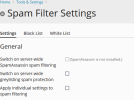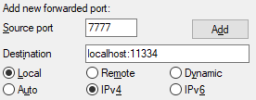Hi Trialotto,
please do not make such assumptions without data to back it up. As I said above, I'm one of the developers of the extension and can guarantee that the extension works (in almost all cases) just fine and as expected. The extension is used on several thousand servers since the release in January without any issues and will replace the built-in SpamAssassin component one day!
With our solution, we rely on open-source tools, and as you know, no software is perfect. There are always edge cases that will make problems. We are working hard to improve the extension further and also cover complex server constellations.
In general, you can increase the debug level in the advanced settings for Amavis and enable SpamAssassin's debug mode, and analyse the mail logs. Also, check the headers of emails that have been classified wrongly. Do you see X-Spam entries? What is the score and how was the score calculated?
Since this topic is complicated and depends on many factors, there is no easy solution. It would be best if one of our trained supporters could analyse the installation and configuration directly on the server.
Cheers
@Viktor Vogel
It is a bit strange that you assume that I do not have the data to back up my statements and/or to confirm the problems that other persons encounter.
I have initiated 5 Azure VMs with your extension activated (free version) and
1 - I did some benchmark testing with SpamExperts and rspamd (custom) cluster as benchmarks - SpamExperts is best, followed by the rspamd (custom) cluster,
2 - I did some testing to recreate issues (as experienced and mentioned by other forum members) : most of the issues did occur randomly - it is hard to recreate the exact issue mentioned by some forum members, but almost alike issues could be forced by simple installing the extension and sending a lot of spam to the test server (read : this is not really an issue, since it is just a lack of "training" and that is just a matter of time, before "training" is sufficient)
and my conclusions are simply that the Plesk Email Security Extension
a)
will work to a low or high degree and
only effectively after
sufficient time for training,
b) is
not outperforming the common alternatives, like SpamExperts or rspamd clusters,
and I really do not expand these conclusions beyond the test setup that I have used.
Sure, the Plesk Email Security Extension is -at least in theory and from the perspective of design- just as good (or bad, depends on who you are asking) as other open source alternatives (including SpamAssassin), with the only exception being the rspamd open source alternative.
This topic is not all complicated - it is just another approach to combatting spam, taking a new road that deviates from the current default combination of both SpamAssassin and Plesk Premium Antivirus (i.e. DrWeb).
It only
becomes complicated,
if you develop an extension that
.... works (in almost all cases) just fine and as expected. The extension is used on several thousand servers since the release in January without any issues and will replace the built-in SpamAssassin component one day!
is
not yet ready for full deployment on several (thousands) servers and/or to replace SpamAssassin.
In short, the many (sometimes very biased) comments and disgruntlement about your extension is simply due to
premature release of the extension.
In my humble opinion, it is a bad thing that this "thing" got released - certainly when taking into account that
people are actually paying for it.
Moreover, you really missed out on the
excellent opportunity to create a Plesk based eco-environment that
combats spam as a network.
Please stop telling that the Plesk Email Security Extension works sufficiently -
it does not for many people and it will never be the best alternative!
Please consider to spend time to develop an extension that includes rspamd with a remote rspamd learning cluster........ that will add value for many people.
As a final remark, I do not want that you see this post as a personal attack - it really is not.
This post
and other posts regarding the Plesk Email Security Extension are simply intended to give them an incentive to consider
your extension,
other Plesk supplied extensions (like the SpamExperts extension)
and all other alternatives out there.
In short, it would give all Plesk users and forum members the
chance to make their own considerations with respect to
what suits their objectives best, as opposed to simply buying a Plesk extension that is communicated as being "good" or even "the best solution".
And yes, again I have to plead for a Plesk extension that offers a Plesk service running a rspamd cluster - see PS1 below.
Also, have a look at PS2 and PS3 below.
I hope that all of the above explains a bit why I am responding to the messages regarding Plesk Email Security Extension.
Kind regards......
PS1
@Viktor Vogel ..... Amavis and ClamAV are not the best tools out there, they are good to very good (and in most cases sufficient). The main problem is that it is open source, implying that these solutions are lagging a bit behind in terms of development - from time to time, this delay in development is causing issues, with the "false positives problem" being a major continuing issue. Despite that Plesk wants to let Plesk users pay for open source tools that can be installed for free and that can be easily integrated with Plesk's Postfix, the
biggest issue is that one relies on "
local training + remote databases". Simply stated, each server with the same Plesk extensions and Amavis + ClamAV (+ SpamAssassin) is reacting differently on spam - training is different, mostly in the short run, but also in the very long run. Nevertheless,
almost all spam attacks are very similar and even originating from identical IP ranges (most of them are not even in the dbases of open source tools). The before simply implies that a "bottom-up approach" of combatting spam per individual server is a bit less efficient that combatting spam in an eco-environment of very similar servers - all Plesk instances are very similar : the value of a Plesk service containing a spam cluster (rspamd based or another solution) is
huge. After all, any remote spam cluster can help Plesk and its extensions do a better job in combatting spam - including your extension.
PS2
@Viktor Vogel ..... there is always a possibility for "advanced spammers" (and, to be honest, most of them are not advanced) to "spam" via the "server-level", due to the fact that Plesk itself and/or Plesk based extensions are not covering spam that will be send via the server FQDN. Most of the spam running through the server and/or spam causing admission of the server IP or FQDN on blocklists and/or spam reaching or trying to reach the server is related to the "server-level" and invisible to Plesk and its extensions. Training of your Plesk Email Security Extension would be more efficient if
all mail related traffic is intercepted and used for training. As far as I know now, this is not (yet) the case.
PS3 I did not find direct evidence for Plesk Email Security Extensions factually solliciting spam, but it seems to be the case that specific servers with specific IPs are aiming for Plesk instances with Plesk Email Security Extension installed. A double check has been done : after uninstalling the extension, the spam related traffic from those IPs stopped suddenly. I do not know why, I firmly belief that it is mere coincidence, nothing more. However, if and whenever possible, please investigate this thoroughly. Please note that it could also coincide with the removal of the packages associated with your extension.





